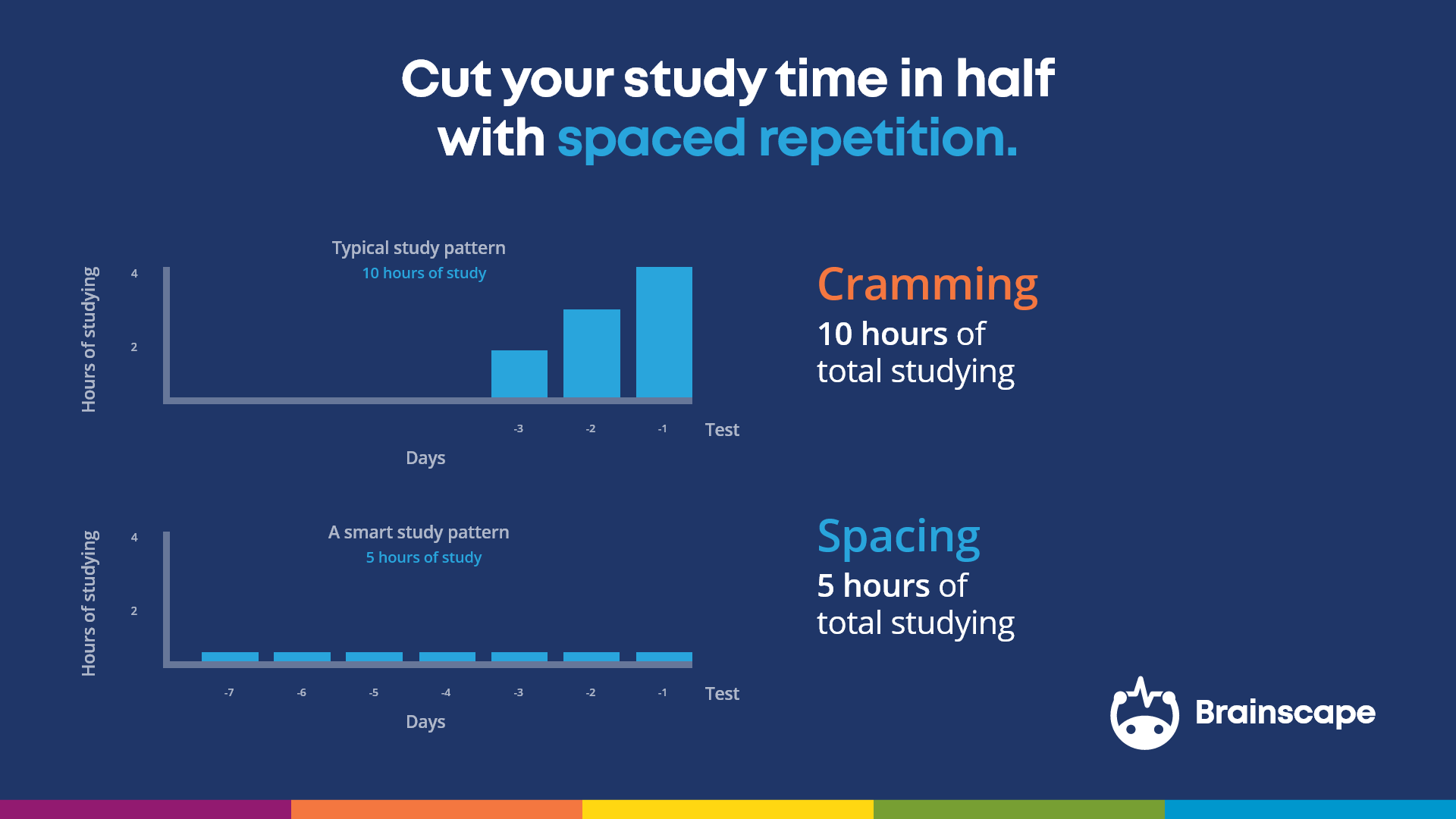Medical school is intense.
No matter how well prepared you might feel, it will be tougher than you expected. The first few weeks are a rapid adjustment where you’ll need to keep pace with the coursework, learn to manage your time productively, and ingrain the right habits so that you get everything done, without neglecting health and self-care. And since med school first year is such a steep learning curve, it seems like everyone has an opinion on what you should be doing and how you should be doing it!
Luckily, there are a few ways you can make your life easier, and we’ve got the right first-year medical school tips in this guide!
Brainscape's team of medical educators has over 50 combined years in medical school and MCAT tutoring, combined with our general learning sciences and software development team. In other words, we know our stuff when it comes to figuring out how to survive medical school.
With that said, here are 5 first-year medical school tips that will help you survive! (You're welcome.)
Tip 1: Manage Your Time Well
This is probably the most important skill for surviving medical school. Staying organized—having a firm eye on what you’ve covered, what you’re currently learning, and what’s coming up next—is crucial for handling the huge increase in academic workload med school dumps on you. This often means avoiding outside work during your first year of med school.
Sure, it's tempting to maintain your pre-med lifestyle, but spreading yourself too thin can lead to epic failure. You need to prioritize among your personal, familial, and outside obligations. It may take a few weeks for you to figure out what balance of social and extracurricular activities you can handle, but coursework must be a priority.
Once you’ve developed the right study habits and time management skills, you can dedicate more time to external activities.
Tip 2: Figure Out How You Learn Best
Many students get through undergrad using just one or two study techniques, like reading and making notes, only to end up cramming at the last minute anyway.
By contrast, in medical school, the sheer volume of information you need to learn means that it is essential to identify the most efficient study methods if you’re to effectively learn all the science content you need in order to become a doctor. It's difficult to catch up in med school once you fall behind, so here are some first-year medical school tips for you to consider:
- Use a combination of learning modes to reinforce everything you learn, without getting bored (Lectures, study notes, flashcards, videos, concept maps, etc)
- Make time daily for constant review so that you memorize the important content as you progress through medical school, and not right at the end when you need to write exams.
- Practice as many exam questions / full-length tests as you can get your hands on right from the beginning of med school and throughout. This builds your critical analysis and reasoning skills, as well as your exam-taking prowess!
- Review the relevant chapters before attending lectures. Pay special attention to the ‘chapter summaries’ and ‘practice questions’ (if any), as this will point you towards what’s most important. Also: use the content to create a list of questions you’d like answers to.
All of these first-year medical school tips will help you cope with the onslaught of content without falling behind.
Remember: spending a little time every day reviewing content is the best and most efficient way to learn it permanently!

A Quick Word About Digital Flashcards
If you want to stay on top of your daily review, digital flashcard apps like Anki Brainscape can help you absorb the required material at twice the speed of traditional study approaches, which is a huge advantage given how much content you need to memorize throughout med school.
Why do they work? When you study with flashcards, you apply a learning method called spaced repetition. Because the brain loses about half of all new information within 24 hours, the only way to retain it is to review the concept repeatedly. That means revisiting the material at the precise moment you’re on the verge of forgetting it.

Apps like Brainscape or Quizlet manage this for you automatically by scheduling cards so they resurface at the right time for your pace of learning.
Adaptive algorithms have been shown to make medical students far more efficient in their studies, and spaced repetition is also used by practicing clinicians to reach their targets faster. In one study of 260 medical students, those who used spaced repetition scored twice as high as the control group after less than a month of practice.
Another strength of flashcards is that they encourage active recall: retrieving the answer from memory rather than recognizing it in notes or multiple-choice lists.
Even when you get something wrong, the act of deliberately trying to recall, followed by instant feedback, strengthens learning for the next round.
Flashcards also support metacognition, or your ability to reflect on your knowledge. By quickly rating how confident you were with each card, you improve awareness of your strengths and weaknesses, which again boosts memory retention.
Digital flashcard apps track your progress and help you build streaks, which is a great way to stay motivated and stick with daily study habits. It’s a simple, powerful tool that makes it easier to stay consistent and succeed in medical school.
Tip 3: Seek Out Senior Students
The third important tip for surviving med school is to seek out students who have gone through exactly what you are about to experience. They can provide valuable information:
- What to expect from med school first year
- How the exams are structured and what they like to test
- The best ways to study and prepare for assessments
- What your professors are looking for
- What books and learning resources are particularly useful, and
- What learning hacks they used to memorize the content (as well as what’s important versus what’s not, and what areas you should be concentrating on).
Remember, you’re looking for people who recently graduated from medical school or who are now in their second, third, or fourth year. Each school does things a little differently, so these students are your best resource for knowing what will work during your first year.
Tip 4: Participate In Social Activities
Med school first year is a huge adjustment, and it’s hard. But then, so is the rest of medical school, which is why having a strong social network is so helpful for keeping you motivated and inspired. Just because you’re training to be a doctor doesn’t mean you can set aside your need for human connection and compassion until you’ve graduated, so connecting with people who know what you’re going through is a huge.
Being able to effectively communicate is also an important skill for a physician, so spending time with other students and working through the material and practice questions provides invaluable training.
Tip 5: Don't Worry About Your Specialty ... Yet
This is an important first-year medical school tip because many students freak out about the fact that they don’t yet know what specialty they want to focus on.
Very few med school first-year students enter medical school knowing exactly where they want to specialize. And even those who do seldom end up where they expected! Rather, treat your first year as a part of the decision-making process.
Seek out extracurricular activities, groups, and research opportunities as low-commitment ways to gain exposure to the specialties you may be interested in. Just make sure that your primary focus is on your studies. A great first year will provide the foundation for a solid STEP 1/COMLEX 1 score, which will open many doors, regardless of what you eventually decide to specialize in.
There is no single best way to get through your first year, but the medical school tips we’ve provided in this guide will definitely serve as a massive leg up, particularly if you take time BEFORE you even start your first class to sort out your strategies for success.
Do your best, roll with the punches, remain organized, make time for health and self-care, and with the right daily study habits, you’ll crush medical school!
Additional Reading
- Is Medical School Hard? Students Say These Are The Hardest Parts
- How To Take An MCAT Practice Test (To Get The Most Out Of It)
- The Best Flashcards For Medical And Nursing Students
References
Dobson, J. L. (2012). Effect of uniform versus expanding retrieval practice on the recall of physiology information. Advances in Physiology Education, 36(1), 6–12. https://doi.org/10.1152/advan.00090.2011
Ebbinghaus, H. (1913). Memory: A contribution to experimental psychology. New York: Teachers College, Columbia University.
Karpicke, J. D. (2012). Retrieval-based learning: Active retrieval promotes meaningful learning. Current Directions in Psychological Science, 21(3), 157-163.
Kerfoot, B. P. (2010). Adaptive spaced education improves learning efficiency: A randomized controlled trial. Journal of Urology, 183(2), 678–681. https://doi.org/10.1016/j.juro.2009.10.005
Kerfoot, B. P., Turchin, A., Breydo, E., Gagnon, D., & Conlin, P. R. (2014). An online spaced-education game among clinicians improves their patients’ time to blood pressure control. Circulation: Cardiovascular Quality and Outcomes, 7(3), 468–474. https://doi.org/10.1161/circoutcomes.113.000814
Kornell, N., Hays, M. J., & Bjork, R. A. (2009). Unsuccessful retrieval attempts enhance subsequent learning. Journal of Experimental Psychology: Learning, Memory, and Cognition, 35(4), 989–998. https://doi.org/10.1037/a0015729
Sadler, P., & Good, E. (2006). The impact of self- and peer-grading on student learning. Educational Assessment, 11(1), 1–31. https://doi.org/10.1207/s15326977ea1101_1
